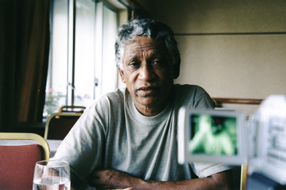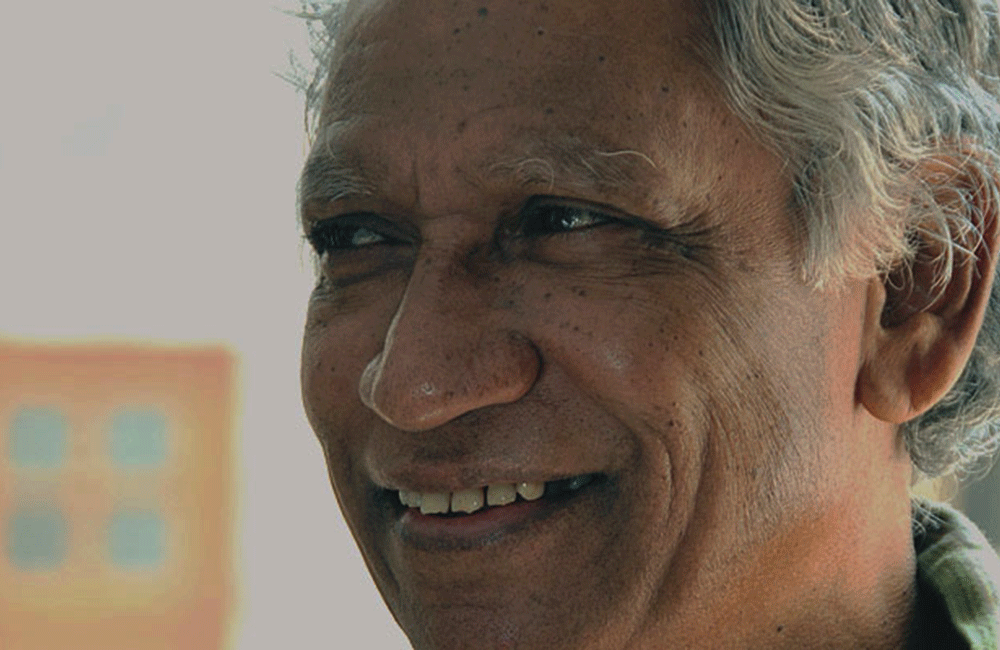This article is reproduced as a tribute to the memory of legendary filmmaker Dharmasena Pathiraja who passed away on Sunday 28, January 2018 at the age of 74.
In Sri Lanka, the '70s represented the rising tide of the revolutionary idealism and the sadistic brutality embodied by the State. The social and cultural fabric - fragmented by ethnic and class disparities - provided the breeding grounds for political discontent and radical activism. The disillusioned youth in the south stormed the bastions of power sending giant ripples across the subcontinent while the young men and women in the north drifted away from the 'mainstream' to confront the deep-seated racial injustices head-on.
In 'The Wretched of the Earth', Fanon wrote 'The colonial world is a world cut in two. The dividing line, the frontiers are shown by barracks and police stations'. The post-colonial Sri Lanka continued to be a society cut in two, where the frontiers were redefined and galvanized along new lines of oppression. The '70s pushed these hidden borderlines onto the surface.
Dharmasena Pathiraja's arrival epitomized this radical rupture with the past. He pioneered a powerful new genre in film making by capturing and creatively exposing the underlying political currents of the changing social landscapes. As one observer vividly puts it, Pathiraja's arrival re-defined 'a socially conscious 'Other' to Lester James Peries' gaze on bourgeois idealism'. His unconventional approach made him stand out from the rest, laying the foundations for a new school of filmmakers.
Dr Pathiraja, in an exclusive interview with the JDS, spoke to Manjula Wediwardane about his work, politics and contemporary cinema.
JDS: Recently, a young Sri Lankan filmmaker, said that “producing a war film is the dream of every film director.” Let me start the conversation by asking your comments on such views. Also, what do you think about the so-called 'Sri Lankan War Cinema' in general?
Dr Dharmasena Pathiraja: As I do not know in what context the other filmmaker made this comment, I cannot comment on its validity. Yet I can say this. War is a horrible thing and war is not there for filmmakers to make films. War happens when negotiation between people and authorities break down, or when social cohesion is shattered. One could make films about that, to capture the problems in modern politics. If you look at the war film genre in general, these films glorify violence. They are generally xenophobic or ultra-nationalist. They glorify militarization and male domination. That is the ideology of war films. If one is to make a film about war, it has to be about the people, people’s heroism, women as they contest male power and male domination within the masculinist ethos of war.
JDS: But instead of such serious attempts, we can only see two prominent tendencies. One is focused on reinventing a fictional past on the basis of "Mahavamsa" while the other trend trying to reinterpret the 'ethnic problem' in the context of 'war victory'. How do you reflect upon such trends?
Pathiraja: There is a culture of political quietism prevailing in the country today, particularly in the cultural sphere. Filmmaking is a mass medium and this political quietist trend is most evident in contemporary filmmaking. Looking to history, particularly as a glorification of the past as a Sinhala Nationalist/Buddhist one, which the political power of the regime is based on, is ideologically and politically very dangerous. This trend of making historical films may not last because the films that belong to this genre have not made any real impact on the cultural makeup of the people. Yet, filmmakers see this genre as a safe bet. The narrowness of this vision is detrimental to filmmaking. Filmmaking is an act of courage on many fronts: Politically, socially and financially. I hope we are able to produce courageous filmmakers who are willing to look at contemporary history and the past in the eye and deal with it honestly.
JDS: What do you think about the close collaboration between the state and the filmmakers?
Pathiraja: If you are talking about state support for films, I am not against it. Filmmakers need to demand support from state funds for filmmaking. This would free us from the vice-like grip of the market. But this support has to be completely free of political interference by the state in any form. This would make for a healthy climate of filmmaking and filmmaking culture would thrive then. If a filmmaker embarks on making films as a part of state propaganda machinery, then we are doomed, and sadly, that is happening amongst us today.
JDS: Since you made your first Tamil film 'Ponmani' in the late '70s, the Tamil people have gone through unimaginable horrors and sufferings. The social fabric in Jaffna now lies in tatters. Looking back, how would you view 'Ponmani' now?
Pathiraja: Ponmani heralds the era of violence/political violence that takes over the society of Jaffna in the ‘70s. Ponmani is about women, family and caste and hints at the non-viability of the Jaffna middle-class economy in the time to come. Though at the time I did not realize this, looking back at it today I see how prescient it is. There was something waiting to happen, and that something would be violent. The violence would be from outside, but importantly, from inside too.
This is a good time for Tamil films and I hope there is support for it. There is a developing space for films in Tamil, but how that space would be utilized is a question. There should be more cultural and political dialogue between all the different communities in Sri Lanka, in this post-war era, and that dialogue would create a space for collaboration as well.
JDS: But still the Tamil society is battling to come to terms with their harrowing experiences and they have hardly recovered from the shock. Whatever may be the intentions, don't you think it is too early - perhaps even wrong in a moral sense - to intervene and interpret their lives in our terms?
Pathiraja: I don’t think anything is too early for anything. But what we need is in-depth understanding and collaboration. I don’t think we should get stuck in binaries of Sinhala/Tamil and or Sinhala/Muslim/Tamil. Yet I can see what you are driving at. It is not the Sinhala perspective that is at fault here. It is the lack of understanding of where the Sinhala perspective fits into the overall scheme of things.
 For instance, where does the Director as a Sinhala person figure in the film itself, within its coding? This is an important aspect.
For instance, where does the Director as a Sinhala person figure in the film itself, within its coding? This is an important aspect.
To put it more simply, it is important to have an in-depth understanding of the society one is working with, the material. When I did Ponmani, Rajadurai’s story grabbed my attention. It was a very simple story, but I saw the depth of it. One has to feel strongly for the people, what is happening to the people, overall, have a strong social commitment, to be honest with oneself. This means one develops an intimacy not only with the people but also with the issues, the material. A combination of this intimacy with the people as well as the politics of the people would make you see that there is an organic link between the people, the issues, and the place. This takes time and time is important.
JDS: Your last film “In Search of a Road” drew considerable attention from many viewers as a serious attempt to explore the geographical and emotional terrains of war-affected regions in the island. What was the reaction of the Sinhala viewers?
Pathiraja: 'In Search of a Road' is not about Tamils per se. It is about the political life of Sri Lankans as ethnic politics and the Sri Lankan state as it impinged on the lives of the people. We were a three-member team of researchers and all of us brought our memories into the research and the script. Our research was driven by memory or personal engagement with events in the past and in contemporary times. This was our strength. When we did research, there was a personal investment. I had large amounts of footage at the end. The film went through multiple versions. What was important was a vision that we carried through the film about the dialogue between all sections of the people. We had an extensive dialogue with different segments of the people, displaced and living in the middle of an intense war.
The most important thing in 'In Search of Road' is about the links between the north and south; both socially and politically. The political links overlap and counter the social and economic links. In trying to trace these links over a 100-year period of history, as ethnic consciousness intensifies and the marginalization of minorities intensifies, leading to violence and war, in the end, I wanted to look at how people coped and how this has impacted on the people. It is the antithesis of a war film. Recently at a screening in Zurich, one of the spectators said, what a quiet film it is. And it is that inner quietness that we need as opposed to the pomp and pageantry of the war films.
The film has been screened in post-war Sri Lanka and continues to make an impact. Interestingly, it evokes different emotions and thoughts among different communities, Northern and Eastern Tamils, and Muslims, upcountry Tamils and the Sinhala people in the south. And all those feelings are important to engage with.
JDS: You belong to the first generation of political filmmakers in the country, who pioneered a new approach in the early '80s widely known as the 'Left Bank Cinema', which was named after Rive Gauche in the French new wave. Do you see any possibilities of reviving such a tendency?
Pathiraja: It would be good to revive a left bank cinema in Sri Lanka. There are so many budding filmmakers who are experimenting with form and content today. And they show a certain kind of sophistication in technique and in the visual medium. But for the most part, I feel there is a lack of a strong commitment to social change in those films. I wonder whether this has to do with our dependence today on film festivals. But this question has to be explored further. So, I too am in search of an answer as to how we can form a film movement that is not prescriptive, that nurtures innovation and experimentation both in form and content, and yet remain politically committed to questioning the status quo, the establishment.
JDS: In most of your films, the 'silence' is used as a form of expression. What do you intend to express through your silence at this time?
Pathiraja: I am biding my time. I have a few good scripts, but in this time of the domination of market forces, compounded by the fact that the space for filmmaking has shrunk and has become increasingly conservative, I must say, that when I do make my next film, it would be an outburst.
Source : JDS Sri Lanka

Leave your comments
Login to post a comment
Post comment as a guest